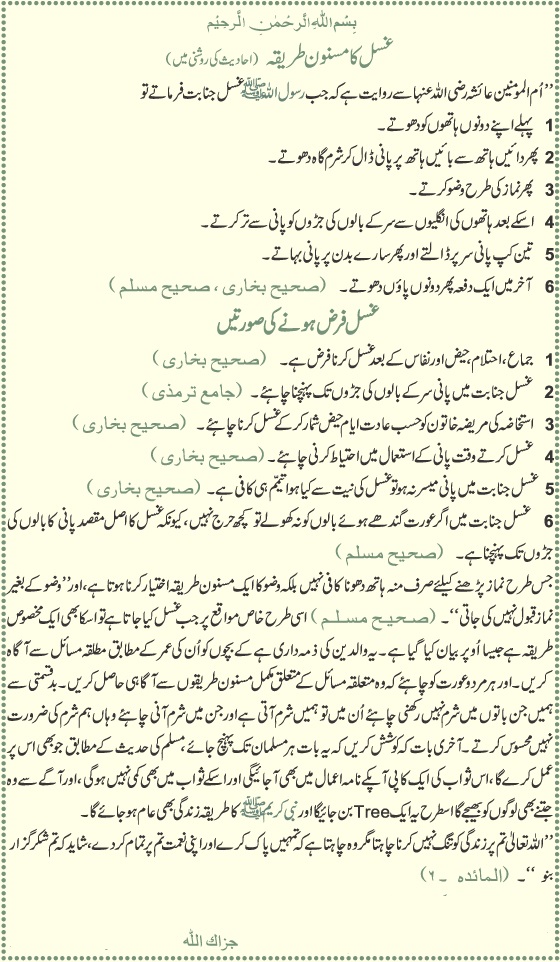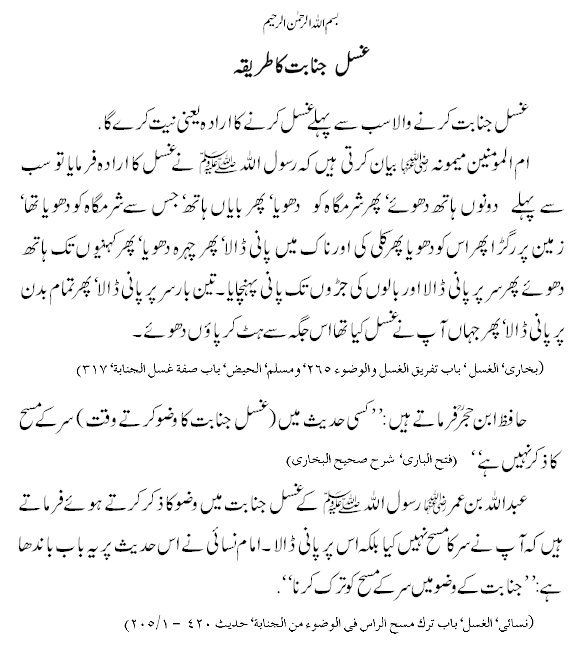The Significance of Ghusal Purification in Islam

The Significance of Ghusal Purification in Islam Ghusal, also spelled as “ghusl” or “ghusul,” is a fundamental ritual purification in Islam.
The Significance of Ghusal Purification in Islam
It holds a significant place in the lives of Muslims as it is an essential part of maintaining physical and spiritual cleanliness. Ghusal involves the complete washing of the entire body in a specific manner, typically performed after certain impure states or actions. This act of purification is steeped in tradition and is governed by Islamic jurisprudence.
Ghusal is not merely a physical cleansing; it carries a profound symbolic meaning in Islam. It signifies the removal of impurities, both physical and spiritual, to prepare oneself for acts of worship and to approach Allah in a state of purity.
It is obligatory in various circumstances, such as after sexual relations, menstruation, post-childbirth, and before certain acts of worship like prayer or entering a mosque. Moreover, it is recommended before the Friday prayer and on special occasions, such as the Eid festivals.
The process of ghusal typically involves washing specific body parts in a particular sequence, including hands, mouth, nose, face, head, and feet, while maintaining a sincere intention of purification throughout. This meticulous ritual serves as a reminder to Muslims about the importance of cleanliness and purity in their faith.
In summary, ghusal is a significant practice in Islam that encompasses both physical and spiritual purification. It is a reminder of the Islamic principles of cleanliness and the importance of approaching acts of worship with a pure heart and body. It exemplifies the holistic nature of Islamic rituals, emphasizing not only outward actions but also inner intention and devotion.
When is Ghusl obligatory
Ghusal, the ritual purification in Islam, becomes obligatory in certain circumstances. Here are some situations and conditions in which ghusal may be obligatory:
- Janabat: Janabat refers to sexual intercourse. After sexual intercourse, whether between a husband and wife or any other man and woman, ghusal becomes obligatory.
- Haiz (Menstruation): After menstruation, women are required to perform ghusal to participate in prayers and other acts of worship.
- Nifas (Postpartum Bleeding): After childbirth, women are obliged to perform ghusal.
- After Burial: Those involved in burying the deceased, known as janaza ghusl, are also required to perform ghusal.
- Ghusl al-Janabat: If someone intends to have sexual intercourse but it does not happen, ghusl al-janabat still becomes obligatory.
- For Jumu’ah (Friday Prayer): It is recommended to perform ghusal before attending the Friday prayer, but it may become obligatory if someone intends to perform the Friday prayer.
- For Eid Festivals: Performing ghusal on the occasions of Eid ul-Fitr and Eid ul-Adha is considered recommended (mustahab), but it is not obligatory to fulfill any specific religious obligation.
The obligation of ghusal depends on the Islamic jurisprudence and the school of thought one follows, so it is advisable to seek guidance from religious scholars or a mufti of one’s school of thought regarding specific matters.
Benefits Of Ghusal
Performing Ghusal, the ritual purification in Islam, offers several benefits, both physical and spiritual, for individuals who practice it regularly and with sincerity. Here are some of the key benefits of Ghusal:
- Physical Cleanliness: Ghusal involves the thorough washing of the entire body, which helps maintain personal hygiene and cleanliness. This physical purification is essential for overall well-being.
- Spiritual Purity: Ghusal signifies the removal of impurities, both physical and spiritual, allowing Muslims to approach acts of worship with a pure heart and body. It helps maintain a state of spiritual cleanliness and prepares individuals for prayer, which is a fundamental aspect of Islamic practice.
- Renewal of Intention: The process of Ghusal begins with a sincere intention of purification. This act of renewing one’s intention for worship and devotion helps individuals refocus their minds on their faith and spirituality.
- Enhanced Concentration in Prayer: Ghusal prepares individuals mentally and spiritually for acts of worship, particularly in the case of daily prayers. A clean and purified state allows for increased concentration and devotion during prayer, enabling a deeper connection with Allah.
- Ritual and Tradition: Ghusal is a significant part of Islamic tradition and ritual. Practicing it reinforces a sense of belonging to the Muslim community and a connection to Islamic heritage.
- Removal of Major Impurities: Ghusal is obligatory after certain impure states, such as sexual intercourse, menstruation, and post-childbirth. By performing Ghusal in these situations, individuals can remove major impurities, ensuring they are ritually pure for prayer and other religious activities.
- Preparation for Special Occasions: Ghusal is recommended on special occasions, such as before attending Friday prayers or on the two Eid festivals (Eid ul-Fitr and Eid ul-Adha). This practice helps individuals prepare themselves both spiritually and physically for these important gatherings.
- Mental and Emotional Cleansing: Ghusal provides an opportunity for self-reflection and inner cleansing. It encourages individuals to examine their thoughts, intentions, and actions, fostering personal growth and spiritual development.
- Community Bonding: Ghusal may be performed collectively in certain situations, such as the preparation of the deceased for burial. This communal act reinforces a sense of unity and support within the Muslim community.
In summary, Ghusal offers a range of benefits, encompassing physical cleanliness, spiritual purity, mental preparation for worship, and a strong connection to Islamic tradition. It is a practice that serves to enhance both an individual’s physical well-being and their spiritual journey in Islam.\
Conclusion
In conclusion, Ghusal holds a central place in Islam, offering a multitude of benefits to those who observe it. It combines physical cleanliness with spiritual purity, fostering a deeper connection to faith and a heightened sense of devotion.
Ghusal not only prepares individuals for acts of worship but also encourages self-reflection and community bonding. Its significance lies not only in the cleansing of the body but also in the purification of the soul, making it an integral and meaningful practice in the lives of Muslims worldwide.



